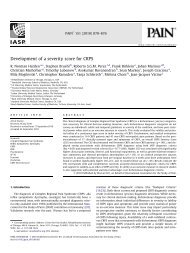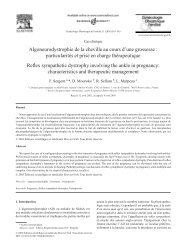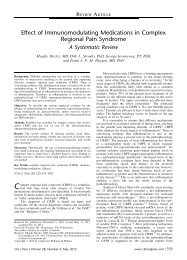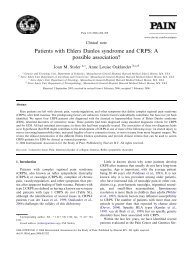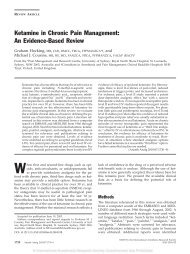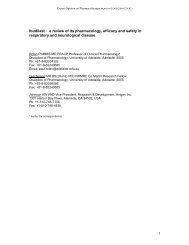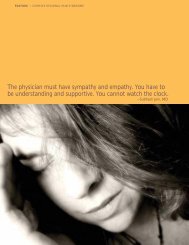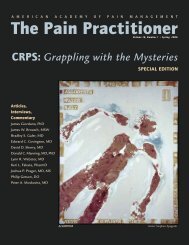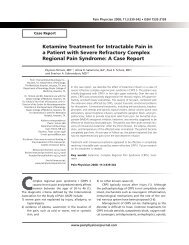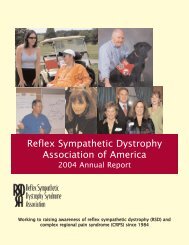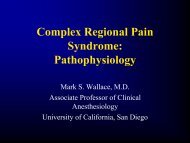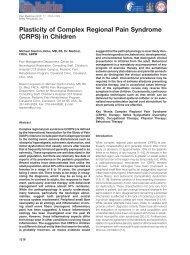- Page 2:
6/6.. 67 Af^e3 ^tbrarg of the 2lor0
- Page 6 and 7:
IMh u Entered, according to Act of
- Page 9:
to Dr. Tyson. S. WEIR MITCHELL. PEE
- Page 12 and 13:
Vin CONTENTS. Diagnosis and Prognos
- Page 14 and 15:
10 INJURIES OF NERVES. This hospita
- Page 16 and 17:
12 INJURIES OF NERVES. organs invol
- Page 18 and 19:
14 INJURIES OF NERVES. ganglion and
- Page 20 and 21:
16 INJURIES OF NERVES. geneous, yet
- Page 22 and 23:
18 INJURIES OF NERVES. muscle would
- Page 24 and 25:
20 INJURIES OF NERVES. are generall
- Page 26 and 27:
1 22 INJURIES OF NERVES. the termin
- Page 28 and 29:
24 INJURIES OF NERVES. highest leve
- Page 30 and 31:
26 INJURIES OF NERVES. nerve contai
- Page 32 and 33:
28 INJURIES OF NERVES. reptiles and
- Page 34 and 35:
CHAPTER III. NEURO-PHYSIOLOGY. Vari
- Page 36 and 37:
32 INJURIES OF NERVES. results of n
- Page 38 and 39:
34 INJURIES OF NERVES. each of thes
- Page 40 and 41:
36 • INJURIES OF NERVES. nerves,
- Page 42 and 43:
38 INJURIES OF NERVES. sometimes ab
- Page 44 and 45:
40 INJURIES OF NERVES. study of thi
- Page 46 and 47:
42 INJURIES OF NERVES. The experime
- Page 48 and 49:
44 INJURIES OF NERVES. now we remem
- Page 50 and 51:
46 INJURIES OF NERVES. evidence in
- Page 52 and 53:
48 INJURIES OF NERVES. iologist. No
- Page 54 and 55:
50 INJURIES OF NERVES. soliitlous.
- Page 56 and 57:
52 INJURIES OF NERVES. states by ch
- Page 58 and 59:
54 INJURIES OF NERVES. purpose of c
- Page 60 and 61:
CHAPTER IV. PHYSIOLOGICAL PATHOLOGY
- Page 62 and 63:
58 INJURIES OF NERVES. visible vess
- Page 64 and 65:
60 INJURIES OF NERVES. palm, and th
- Page 66 and 67:
62 INJURIES OF NERVES. track half-w
- Page 68 and 69:
64 INJURIES OF NERVES. antique Fren
- Page 70 and 71:
66 INJURIES OF NERVES. foot, there
- Page 72 and 73:
68 INJURIES OF NERVES. very often d
- Page 74 and 75:
70 INJURIES OF NERVES. connective s
- Page 76 and 77:
72 INJURIES OF NERVES. wound to the
- Page 78 and 79:
74 INJURIES OF NERVES. the subject
- Page 80 and 81:
76 INJURIES OF NERVES. as the sixth
- Page 82 and 83:
78 INJURIES OF NERVES. currents of
- Page 84 and 85:
80 INJURIES OF NERVES. small animal
- Page 86 and 87:
CHAPTER V. VARIETIES OF MECHANICAL
- Page 88 and 89:
84 INJURIES OF NERVES. regions of t
- Page 90 and 91:
86 INJURIES OF NERVES. Case 5.*—
- Page 92 and 93:
79°
- Page 94 and 95:
90 INJURIES OF NERVES. sensitive su
- Page 96 and 97:
92 INJURIES OF NERVES. M. Berard ha
- Page 98 and 99:
94 INJURIES OF NERVES. More severe
- Page 100 and 101:
96 INJURIES OF NERVES. also to be f
- Page 102 and 103:
98 INJURIES OF NERVES. late Prof. M
- Page 104 and 105:
100 INJURIES OF NERVES. the head of
- Page 106 and 107:
102 INJURIES OF NERVES. Case 10.—
- Page 108 and 109:
104 INJURIES OF NERVES. also hard a
- Page 110 and 111:
' 106 INJURIES OF NERVES. A number
- Page 112 and 113:
^108 INJURIES OF NERVES. was usuall
- Page 114 and 115:
110 INJURIES OF NERVES. involved, a
- Page 116 and 117:
112 INJURIES OF NERVES. A tube of g
- Page 118 and 119:
114 INJURIES OF NERVES. when we com
- Page 120 and 121:
116 INJURIES OF NERVES. istence, in
- Page 122 and 123:
118 INJURIES OF NERVES. coufoiinded
- Page 124 and 125:
120 INJURIES OF NERVES. the lumbar
- Page 126 and 127:
122 INJURIES OF NERVES. nerves, or
- Page 128 and 129:
J24 INJURIES OF NERVES. the sacral
- Page 130 and 131:
126 INJURIES OF NERVES. orous sbamp
- Page 132 and 133:
128 INJURIES OF NERVES. to determin
- Page 134 and 135:
130 INJURIES OF NERVES. and those o
- Page 136 and 137:
132 INJURIES OF XERVES. An ac- wate
- Page 138 and 139:
134 INJURIES OF NERVES. good flexio
- Page 140 and 141:
• 136 INJURIES OF NERVES. and dow
- Page 142 and 143:
138 INJURIES OF NERVES. The followi
- Page 144 and 145:
140 INJURIES OF NERVES. but there s
- Page 146 and 147:
142 INJURIES OF NERVES. sensory gan
- Page 148 and 149:
144 INJURIES OF NERVES. see, many o
- Page 150 and 151:
146 INJURIES OF NERVES. ralysis of
- Page 152 and 153:
148 INJURIES OF NERVES. nerves divi
- Page 154 and 155:
150 INJURIES OF NERVES. disappears,
- Page 156 and 157:
152 INJURIES OF NERVES. may alight
- Page 158 and 159:
154 INJURIES OF NERVES. ing certain
- Page 160 and 161:
156 INJURIES OF NERVES. reported in
- Page 162 and 163:
158 INJURIES OF NERVES. tightly dra
- Page 164 and 165:
160 INJURIES OF NERVES. Case 27.—
- Page 166 and 167:
162 INJURIES OF NERVES. stage to be
- Page 168 and 169:
164 INJURIES OF NERVES. and unable
- Page 170 and 171:
IGG INJURIES OF XERVES. At the same
- Page 172 and 173:
168 INJURIES OF NERVES. was dry, sc
- Page 174 and 175:
170 INJURIES OF NERVES. We may then
- Page 176 and 177:
172 INJURIES OF NERVES. supported b
- Page 178 and 179:
174 INJURIES OF NERVES. method of s
- Page 180 and 181:
176 INJURIES OF NERVES. in the limb
- Page 182 and 183:
178 INJURIES OF NERVES. those which
- Page 184 and 185:
180 INJURIES OF NERVES. be found el
- Page 186 and 187:
182 INJURIES OF NERVES. loss of tac
- Page 188 and 189:
184 INJURIES OF XERVES. there are t
- Page 190 and 191:
186 . INJURIES OF NERVES. US, when
- Page 192 and 193:
188 INJURIES OF NERVES. the muscle
- Page 194 and 195:
190 INJURIES OF NERVES. have no ele
- Page 196 and 197:
192 INJURIES OF NERVES. Loss of the
- Page 198 and 199:
194 INJURIES OF NERVES. of the pain
- Page 200 and 201:
196 INJURIES OF NERVES. injuries of
- Page 202 and 203:
198 INJURIES OF NERVES. bad cases k
- Page 204 and 205:
200 INJURIES OF NERVES. sergeant 26
- Page 206 and 207:
202 INJURIES OF NERVES. the body, s
- Page 208 and 209:
204 INJURIES OF NERVES. f most cons
- Page 210 and 211:
206 INJURIES OF NERVES. scribed, bu
- Page 212 and 213:
208 INJURIES OF NERVES. the tenth d
- Page 214 and 215:
210 INJURIES OF NERVES. contraction
- Page 216 and 217: 212 INJURIES OF NERVES. great pecto
- Page 218 and 219: 214 INJURIES OF NERVES. cannot be s
- Page 220 and 221: 216 INJURIES OF NERVES. elbow must
- Page 222 and 223: 218 INJURIES OF NERVES. vein, or th
- Page 224 and 225: 220 INJURIES OF NERVES. Taste was r
- Page 226 and 227: 222 INJURIES OF NERVES. motor loss,
- Page 228 and 229: 224 INJURIES OF NERVES. themselves
- Page 230 and 231: 226 INJURIES OF NERVES. of sensory
- Page 232 and 233: 228 INJURIES OF NERVES. The contrac
- Page 234 and 235: 280 INJURIES OF NERVES. warning in
- Page 236 and 237: 232 INJURIES OF NERVES. Two weeks l
- Page 238 and 239: 234 INJURIES OF NERVES. It was empl
- Page 240 and 241: 236 INJURIES OF NERVES. was slight
- Page 242 and 243: 238 INJURIES or nerves, iug a ribbo
- Page 244 and 245: 240 INJURIES OF NERVES. mortem exam
- Page 246 and 247: 242 INJURIES OF NERVES. cases left
- Page 248 and 249: CHAPTER XL TREATMENT— CONTINUED.
- Page 250 and 251: 246 INJURIES OF NERVES. and the con
- Page 252 and 253: 248 INJURIES OF NERVES. current, on
- Page 254 and 255: 250 INJURIES OF NERVES. At the Unit
- Page 256 and 257: 252 INJURIES OF NERVES. healthy ton
- Page 258 and 259: 254 INJURIES OF NERVES. gained, exc
- Page 260 and 261: 256 INJURIES OF NERVES. look precis
- Page 262 and 263: 258 INJURIES OF NERVES. We used inj
- Page 264 and 265: 260 INJURIES OF NERVES. called npon
- Page 268 and 269: i 264 INJURIES OF NERVES. and local
- Page 270 and 271: 266 INJURIES OF NERVES. Counter-irr
- Page 272 and 273: 268 INJURIES OF NERVES. were someti
- Page 274 and 275: 270 INJURIES OF NERVES. evidence of
- Page 276 and 277: 272 INJURIES OF NERVES. and at last
- Page 278 and 279: 274 INJURIES OF NERVES. May 3, 1863
- Page 280 and 281: 276 INJURIES OF NERVES. — July 15
- Page 282 and 283: 278 INJURIES OF NERVES. Electric te
- Page 284 and 285: 280 INJURIES OF NERVES. Large numbe
- Page 286 and 287: CHAPTER XII. TREATMEN T— C ONTINU
- Page 288 and 289: 284 INJURIES or nerves. but unless
- Page 290 and 291: 286 INJURIES OF NERVES. an inch of
- Page 292 and 293: j ' 2S8 INJURIES OF NERVES. OPERATI
- Page 294 and 295: j 290 INJURIES OF ^"EllVES. OPERATI
- Page 296 and 297: 292 INJURIES OF NERVES. I add, as e
- Page 298 and 299: 294 INJURIES OF NERVES. shining. Th
- Page 300 and 301: 296 INJURIES OF NERVES. section of
- Page 302 and 303: 298 INJURIES OF NERVES. fifth or on
- Page 304 and 305: 300 INJURIES OF NERVES. a hot stove
- Page 306 and 307: 302 INJUKIES OF NERVES. or from our
- Page 308 and 309: 304 INJURIES OF NERVES. tracted, au
- Page 310 and 311: 306 INJURIES OF NERVES. Motion.—
- Page 312 and 313: "308 INJURIES OP NERVES. by callus.
- Page 314 and 315: SIO INJURIES OF NERVES. exchanged.
- Page 316 and 317:
312 INJURIES OF NERVES. with a hand
- Page 318 and 319:
314 INJURIES OF NERVES. flexors and
- Page 320 and 321:
316 INJURIES OF NERVES. February 19
- Page 322 and 323:
CHAPTER XIII. LESIONS OF SPECIAL XE
- Page 324 and 325:
320 INJURIES OF NERVES. he was hurt
- Page 326 and 327:
322 INJURIES OF NERVES. also more p
- Page 328 and 329:
324 INJURIES OF NERVES. a man who h
- Page 330 and 331:
apidly-developed tuberculosis. > A
- Page 332 and 333:
328 INJURIES OF NERVES. rior wound
- Page 334 and 335:
330 INJURIES OF NERVES. downward. H
- Page 336 and 337:
332 INJURIES OF NERVES. for the bal
- Page 338 and 339:
334 INJURIES OF NERVES. to the time
- Page 340 and 341:
336 INJURIES OF NERVES. the patient
- Page 342 and 343:
338 INJURIES OF NERVES. their exten
- Page 344 and 345:
340 INJURIES OF NERVES. assisted. M
- Page 346 and 347:
CHAPTER XIV. NEURAL MALADIES OF STU
- Page 348 and 349:
344 INJURIES OF NERVES. removed, th
- Page 350 and 351:
346 INJURIES OF NERVES. they are un
- Page 352 and 353:
348 INJUKIES OF NERVES. side. In an
- Page 354 and 355:
350 INJURIES OF NERVES. most absurd
- Page 356 and 357:
352 INJURIES OF NERVES. learns by d
- Page 358 and 359:
354 INJURIES OF NERVES. ally some d
- Page 360 and 361:
356 INJURIES OF NERVES. crushed by
- Page 362 and 363:
358 INJURIES OF NERVES. lu some of
- Page 364 and 365:
360 INJUKIES OF NERVES. will to mov
- Page 366 and 367:
362 INJURIES OF NERVES. « put off
- Page 368 and 369:
364 INJURIES OF NERVES. biceps bega
- Page 370 and 371:
366 INJURIES OF NERVES. that the ar
- Page 372 and 373:
368 INJURIES OF NERVES. I think tha
- Page 374 and 375:
370 INDEX. Burning pain, seat of, 1
- Page 376 and 377:
^ 372 INDEX. Gross, S. D., incontin
- Page 378 and 379:
374 INDEX. Neuritis, constitutional
- Page 380 and 381:
376 INDEX. Sense of locality, 185.
- Page 385:
ts to




